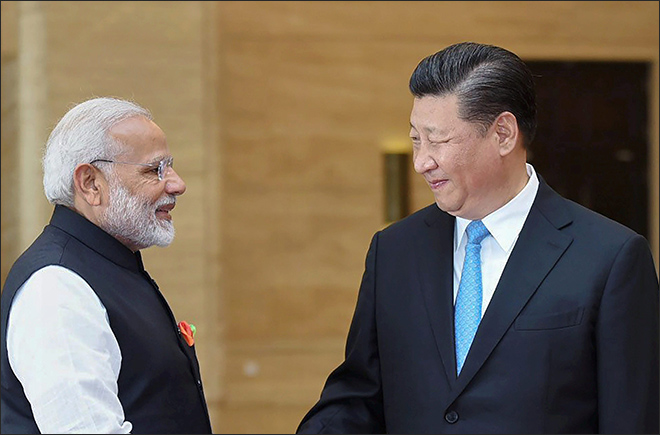
There is growing recognition and acceptance, not just in Asia but even as far away as Europe, that China is wielding its growing power in a manner that requires countering. China’s behaviour is not much of a surprise: China is only doing what any other country that has amassed such enormous power would do, though, perhaps, China is being somewhat strategically foolish in making so many enemies so quickly. But if the consequences of China’s rise on its behaviour is understandable, so should be the response: those that are impacted by China’s behaviour can either accept to be Finlandised or seek to balance China. There is no third way. On the other hand, just as an international consensus emerges about the threat China poses, India seems to want to pursue a third way. But a hedging strategy is bound to fail.
Balancing China does not mean India cannot have civil diplomatic ties or trade and other interactions with China or even cooperate with China on issues of common concern, such as trade. What balancing China means is developing the capacity and linkages to counter China’s political and military efforts against India. This requires building up India’s defence capacity, but even more so, it requires bringing together a group of like-minded states who are willing to stand together to support each other in the international arena when they become targets of China’s ire or worse. This is not an easy task, even if Beijing’s behaviour is making the task slightly less onerous. Indeed, the recent Shangri La Dialogue in Singapore witnessed the growing willingness of states across the region to be much more forthcoming in their criticism of China, even if most of them did this without actually naming China. Western scholars, especially American ones, may worry about the effect Trump’s erratic foreign policy on allies, but there was hardly any reflection of this in the official speeches in Singapore because of the clarity of the China threat.
Balancing China does not mean India cannot have civil diplomatic ties or trade and other interactions with China or even cooperate with China on issues of common concern, such as trade. What balancing China means is developing the capacity and linkages to counter China’s political and military efforts against India.
This is why the shift in Indian foreign policy over the last few months is so disappointing. There have been suspicions that New Delhi, after half-heartedly pursuing a balancing strategy for a couple of years, was beginning once again to search for a third way. A series of recent Indian foreign policy moves only serve to deepen this concern. These include “informal” summits between Indian Prime Minister Narendra Modi and the leaders of China and Russia (in turn), the Prime Minister’s speech at the Shangri La Dialogue in Singapore, his visit to Indonesia, as well as the Shanghai Cooperation Organisation (SCO) meeting in Qingdao. Taken together, it appears to indicate that India is going back to a hedging strategy: attempting to find a modus vivendi with Beijing while also moving slowly to build security and political links with a number of other powers in the region and outside as an insurance against China.
New Delhi is not entirely giving up on efforts to build a balance to China. In most major speeches and statements, there has been oblique criticism of China by outlining the need to maintain freedom of navigation and peaceful settlement of disputes, or as the Prime Minister put it in his Shangri La speech: “qual access under international law use of common spaces on sea and in the air that would require freedom of navigation, unimpeded commerce and peaceful settlement of disputes in accordance with international law.” There is also a tentative — very tentative — effort at making common cause on this issue with other states, Indonesia being the latest candidate. These are necessary steps, even if one can quibble about the seeming wariness and slowness with which they are being taken.
 New Delhi has not entirely given up on efforts to build a balance to China. | Source: PTI
New Delhi has not entirely given up on efforts to build a balance to China. | Source: PTI
There is also little indication that India is backing away from its security relationship with the US and its allies in the Indo-Pacific. Though these are not moving forward with any great speed — Australia is still out of the Malabar Exercise, India refuses to acknowledge the real security purpose behind the Quad, and US-India defence relationship is still limited by 1970s-style suspicions of even bureaucratic, low-level facilitation agreements such as COMCASA and BECA — India is not withdrawing from them either. And even the languid pace is not entirely out of character for Indian strategic policy.
What is different is that New Delhi, alongside, is also trying to reassure China and find common ground with it, apparently attempting to demonstrate to China that India has no interest in balancing or containing China. India’s friendships “are not alliances of containment” and it is not on “one side of a divide or another” as Modi stressed, more than once, in his Singapore speech. India wants a “multipolar world” as the Ministry of External Affairs press release stated after the informal Modi-Putin summit. New Delhi seems to be hoping that common interests — especially on trade — would override any other disagreements they may have.
What is different is that New Delhi, alongside, is also trying to reassure China and find common ground with it, apparently attempting to demonstrate to China that India has no interest in balancing or containing China.
This is unlikely to work. It will satisfy neither China nor the partners that India hopes to balance China with. China is in any case unlikely to trust India, materially the best endowed state in China’s neighborhood. To suggest, as Modi did, that India sees the Indo-Pacific as a “natural region.. not as a strategy or as a club of limited members.. directed against any country” will be seen in Beijing as conference hall sophistry to which it will pay little heed in the light of India’s continued balancing efforts. Indeed, after months of this shift, there is little indication that China has in any way moderated its containment and balancing effort against India: little indication of pausing the military build-up in Tibet or expanding into the Indian Ocean, no give on multilateral forums such as the Nuclear Supplier’s Group (NSG) or on the Masood Azhar issue at the UN, and no moderation of its support to Pakistan. And this is perfectly natural: India is asking China to trust its words, not its actions. Beijing knows better.
On the other hand, India’s shift towards hedging will reduce the confidence of India’s potential partners, especially in the Indo-Pacific region. New Delhi worries about the constancy of its partners, but it should recognise that this is an equally valid concern for others. Any perception of India’s unreliability as a partner would make it difficult to build the Asian balance that New Delhi claims to want. For potential partners, India’s efforts to reach out to China will be seen as a signal of its lack of faith in building a balance against China. If India, the most capable regional balancer to China, is seen as reluctant, building an Asian balance will become that much more difficult.
The consequence of this hedging strategy will be that India will neither reduce the threat it faces from China nor have the partners it needs to counter this threat. This is the worst of all possible outcomes. We can hope that this is a short-term strategy forced by electoral compulsions, but even so, its effects are likely to be real and potentially enduring.
The views expressed above belong to the author(s). ORF research and analyses now available on Telegram! Click here to access our curated content — blogs, longforms and interviews.




 New Delhi has not entirely given up on efforts to build a balance to China. | Source: PTI
New Delhi has not entirely given up on efforts to build a balance to China. | Source: PTI PREV
PREV


